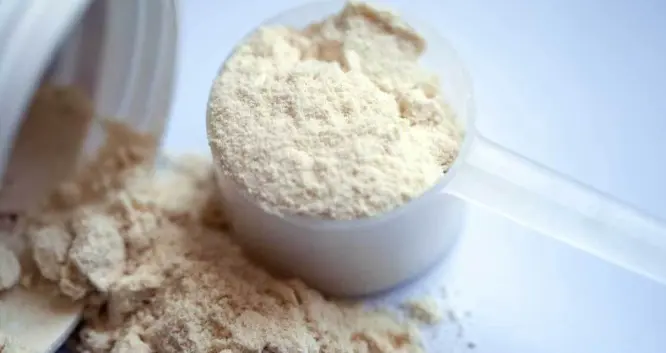Is Whey Protein Powder Good For Your Health?
1.What Is Whey Protein Powder?
Whey protein powder refers to a group of eight proteins found in milk. These proteins, in order from the biggest to smallest amounts in milk, are:Beta-lactoglobulin,Alpha-lactalbumin,Glycomacropeptide,Immunoglobulins,Bovine serum albumin,Lactoferrin,Lactoperoxidase,Lysozyme.
Types of whey protein
Whey protein powder then undergoes another process to make one of three main types:
• Concentrate: Products with whey protein concentrate vary widely in their protein, lactose and fat content. Whey protein concentrate is in many protein drinks, bars and nutritional products. It’s also used in infant formula.
• Isolate: This type is consistently high in protein and low in fat or lactose. You may see it listed on the labels of protein supplements, such as bars and drinks. Whey protein isolate may be a suitable choice for people who are lactose intolerant — but don’t try any of these if you have a milk allergy.
• Hydrolysate: Also known as hydrolyzed whey protein, whey hydrolysate is the easiest to digest. It’s gentle on digestion because its long protein chains, called peptides, are pre-broken down into shorter ones. Specialized infant formulas often use hydrolyzed whey protein. You may also see it in medical supplements for nutritional deficiencies.

2.What Are The Benefits Of Whey Protein?
Whey protein supplements have been linked to a few health benefits, including promoting weight loss, increasing muscle mass and strength, and lowering heart disease risk factors.
It May Encourage Weight Loss
Whey protein powder may help reduce appetite, which can promote weight loss. Studies show that consuming whey protein decreases hunger and increases satiety-inducing hormones such as peptide YY and glucagon-like peptide.
A 2011 study that included 90 adults who were overweight or obese found that those who supplemented with 56 grams of whey protein per day for 23 weeks experienced a 5 pound (2.3kg) greater fat loss than those who supplemented with soy protein.
A 2018 review of nine studies found that participants who were supplemented with whey protein experienced significant reductions in fat mass and body weight compared to participants who were randomized to placebo treatments.

It's Effective for Increasing Muscle Mass
Whey protein powders are popular amongst gym-goers and those looking to bulk up. This is because whey protein is rich in the amino acids your body needs to build muscle.
A small 2019 study that included 18 healthy adults found that participants who supplemented with hydrolyzed whey protein immediately before and after resistance training workouts three times per week for 12 weeks had greater increases of muscle circumference and strength compared to the placebo group.
Sports performance experts recommend consuming between 20-25 grams of leucine-rich protein, such as a whey protein shake, after resistance training in order to maximize muscle growth. Leucine is an amino acid found in whey protein that plays an important role in protein synthesis and muscle repair.
Additionally, research suggests that whey protein supplements can help support muscle recovery after intense exercise by speeding muscle repair and restoring muscle function.
Keep in mind that, in addition to athletes, whey protein supplements can also help non-athletes, such as older adults, build muscle mass and strength.

It May Help Reduce Heart Disease Risk Factors
Your risk of developing heart disease depends on several factors, such as your body weight and your blood pressure levels and blood sugar levels.
Studies show that consuming whey protein may help reduce certain heart disease risk factors, such as high blood pressure, blood sugar, and blood lipid levels.
A 2018 review of nine studies found that participants who were supplementing with whey protein experienced improvements in heart disease risk factors including blood pressure, glucose, heart-protective HDL, and total cholesterol.
Wirunsawanya K, Upala S, Jaruvongvanich V, Sanguankeo A. Whey protein supplementation improves body composition and cardiovascular risk factors in overweight and obese patients: a systematic review and meta-analysis.

A 2020 review of 22 studies also found that consumption of whey protein resulted in significant reductions in the long-term marker of blood sugar control hemoglobin A1c (HbA1c) as well as triglyceride levels, total cholesterol, and LDL cholesterol compared to placebo treatments.10
Product Recommendations
Our team of registered dietitians thoroughly research and review supplements, speaking to experts and evaluating each product for safety, efficacy, dosage, quality of ingredients, and testing certifications. We also test protein powders in our lab for taste, texture, smell, and more to determine our top picks. You can find all of our recommendations in our complete guide to whey protein powders, but these two of our top choices.
3.How Much Protein Do You Need?
You need to take in a certain amount of protein every day in order to meet your body’s needs. The recommended dietary allowance (RDA) for protein is currently set at 0.8 grams per kg (g/kg) of body weight (0.36 grams of protein per pound (g/lb)). However, even though you may think of this as the amount of protein you should be aiming for on a daily basis, the RDA is actually the minimum intake necessary to meet the body’s amino acid requirements, maintain nitrogen balance, and prevent muscle loss.
This means that most people need to take in more protein than the current RDA to promote optimal health. Experts suggest that the people who are physically active should take in between 1.2-2.0 g/kg per day (.54-.9 g/lb), while athletes and people who are trying to build muscle may need to take in more than 2.0 g/kg per day (.9 g/lb).
Using whey protein is an easy way to meet protein requirements, especially for people with elevated protein needs, such as athletes and people trying to gain muscle mass.
4.Are There Side Effects of Taking Whey Protein?
Whey protein powderis generally considered safe and isn't associated with many side effects. However, it's not the right choice for everyone.
It isn't appropriate for vegans: Whey protein is derived from the milk of animals, such as cows and goats, so it's not appropriate for people who exclude animal products from their diets.
It may cause acne in some people: Whey protein may promote the production of hormones such as IGF-1, which could contribute to acne development. A 2013 study in 30 people between the ages of 18 and 45 found that whey protein use was associated with the onset of acne over a 2-month period.
May cause digestive upset: People who have a hard time digesting the milk sugar lactose may experience digestive symptoms like bloating and gas after consuming lactose-containing products, such as whey protein concentrate. People who are lactose intolerant should choose lactose-free protein powders such as pea protein or opt for a lactose-free whey protein product.
It's also important to note that whey protein isn't safe for children and adults who have an allergy to milk. Milk allergy is much more common in children, but can impact adults as well.
People who are allergic to milk should avoid milk and products derived from milk, including whey protein.
Lastly, some whey protein products are high in added sugar, which should be kept to a minimum in order to promote optimal health. When shopping for whey protein products, it's best to choose an unsweetened product or opt for a whey protein flavored with a natural sweetener like monk fruit.
Conclusion
Whey protein powder is a popular dietary supplement that's often used by people who want to build and maintain muscle mass.In addition to supporting a healthy body composition, supplementing with whey protein may help you lose body fat and lower your risk of heart disease by improving heart disease risk factors like high cholesterol and blood pressure levels.
While whey protein is generally safe and well-tolerated, it may increase the risk of developing acne in some people and isn't appropriate for vegans or people who are lactose intolerant. Whey protein should also be avoided by those with a milk allergy.
If you have more questions, please contact us
References
https://health.clevelandclinic.org/is-whey-protein-good-for-you
https://www.health.com/whey-protein-7376427

 Food Additives
Food Additives









